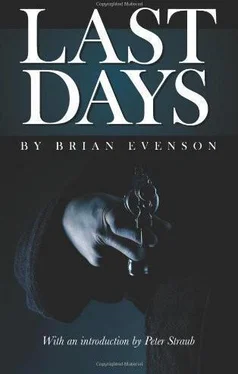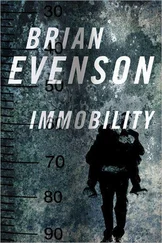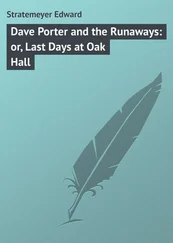"Kline?" said the guard. "We've been waiting for him. He can come in, too, the other one will have to wait outside."
Kline felt something on his shoulder and looked back to see Gous' stump lying there. "A pleasure, Mr. Kline," Gous said. "Don't forget me."
"I won't," said Kline, confused.
The guard ushered them through the gate and into a bare, white hall. Before the door closed Kline looked behind him to see Gous on the other side, tilting his head trying to see in.
This guard, Kline saw, had only one hand, all the fingers on it shaved away except for the thumb and the bottom half of the forefinger.
The guard led them down the white hall to a door at the end, knocked three times.
"You're lucky," said Ramse.
"Lucky?"
"To come in," said Ramse. "Normally a one wouldn't be allowed. There had to be a special dispensation."
"I don't feel lucky," said Kline. The guard turned around and looked at him, hard, then turned away, rapped three more times.
"Don't say that," whispered Ramse. "You don't know how hard it was to convince them to bring you."
The door came open, another guard pushing his face out. Ramse and Kline watched their guard push his face in and whisper to the other. They whispered back and forth a few times then the other guard nodded, opened the door.
"Go ahead," said the first guard. "Go through."
Ramse and Kline passed through the door, the second guard letting them come in and then shutting it behind them. Inside was a stairwell. The guard led them up it to the third floor, led them down a hall, past three doors, stopped to knock on a fourth. When a muffled voice answered from behind, he opened it, ushered them in.
The room was large, Spartan in furnishing: a bed sitting low to the floor, a low desk, a small bookshelf, a reclining chair. In the latter sat a man wearing a bathrobe. He was missing an arm and a leg, his robe cut away and left open at shoulder and hip to reveal the planed surfaces, hardly stumps at all. The other arm and leg were intact, though the hand was missing all but two of its fingers, the foot all but the big toe. Both ears, too, had been cut off, leaving only a hole and a shiny patch of flesh on either side of the head. One eyelid was open, revealing a piercing eye, the other closed but deflated, the eye under it clearly absent.
"Ah," said the man. "Mr. Kline, I presume. I had assumed you had refused our invitation several weeks ago."
"It seems not," said Kline.
"He's delighted to be here," said Ramse, quickly. "It's a true pleasure for him, as well as for me, sir, to be granted audience with-"
"I wonder," said Borchert, raising his voice. "Mr. Ramse, isn't it?"
"Yes," said Ramse, "I'm-"
"I wonder, Mr. Ramse, if you'd mind waiting outside. Mr. Kline and I have private matters to discuss."
"Oh," said Ramse, looking crestfallen. "Yes, of course."
"An eight," said Borchert, once Ramse was gone, "though you wouldn't know it to look at him. What does he mean by wearing shoes in here? Where are his manners?"
"Do you want me to take my shoes off?"
"Are you missing any toes?"
"No," said Kline.
"There's no point then, is there?" said Borchert. "But come a little closer and show me your stump."
Kline went closer. He held his missing hand out; Borchert took it deftly between his remaining fingers and thumb and pulled it forward until it was only inches from his face, his eyes dilating.
"Yes, nicely done," said Borchert. "Quite professional. But I'd thought you were a self-cauterizer?"
"I was," said Kline. "It was redone afterwards."
"What a shame," said Borchert, smiling thinly. "Still, a good start nonetheless." He let go of Kline's hand, readjusted himself in his chair. "You're welcome to sit down," he said. "Unfortunately I'm in the only chair. Do feel free to help yourself to the floor."
Kline looked about him, finally settling to the floor, posting his stump against it and bringing the rest of his body down.
"There," said Borchert. "That's better now, isn't it. I suppose you're wondering why you're here."
"The investigation," said Kline.
"The investigation," said Borchert. "That's right. You want the details."
"No," said Kline.
"No?"
"I'm wondering how I can arrange to leave."
"Leave me?" said Borchert. "You find me offensive somehow?"
"Leave this whole place."
"But why, Mr. Kline?" said Borchert, smiling. "This is paradise."
Kline did not say anything.
Borchert let his smile fade slowly, artificially. "I was against bringing you," he said. "I don't mind telling you. No outsiders has always been my policy, and no recruiting. But some of the others were impressed by this story of self-cauterization. Perhaps it's nothing more than a story, Mr. Kline?"
"No," said Kline. "It's true."
"But why, Mr. Kline? Surely you could have easily applied a tourniquet and called a doctor?"
"Then I wouldn't have been able to kill the man who cut my hand off."
"The so-called gentleman with the cleaver," said Borchert, nodding. "But surely you could have killed the fellow later?"
"No," said Kline. "It was either him or me, right then. I cauterized the arm to distract him. He couldn't quite take in what I was doing, which gave me a certain advantage. Otherwise, he would have shot me."
"Yet you could take it in, Mr. Kline, even though it was your own arm. And afterwards your remaining hand was steady enough to shoot him through the eye. You were God for a moment, even if you didn't realize it. I suspect you tapped into something without knowing it, Mr. Kline. An ecstasy. I almost begin to suspect we have something to learn from you."
"I wouldn't think so," said Kline.
"Modest, too," said Borchert. "You know what you've done to our community? You've started something, Mr. Kline. Everybody is talking about self-cauterization. The creed is threatening to transform. Schism. No selfcauterizers yet, but it's only a matter of time, and then smoothly cut surfaces," he said, gesturing at his missing arm and leg, "are likely to give way to hard-puckered and rippled stumps, ugly and dappled. A little bit rough trade, no? I can't say it's to my taste, Mr. Kline, but perhaps I'm becoming antiquated."
"Perhaps," said Kline.
Borchert looked at him sharply. "I doubt it," he said. "In any case, Mr. Kline, despite my personal objections to you, now that you are here, I can't afford to let you go. Too much is at stake. I send you out of here without an investigation and we'll have a schism."
"I'm not staying," said Kline.
"You leave and I'll have to kill you," said Borchert. "For the good of the faith. Nothing personal."
Kline looked at his hand, then looked at Borchert.
"Wouldn't you like to at least hear about it, Mr. Kline? Before deciding if it's worth dying for?"
"All right," said Kline. "Why not?"
"A crime has been committed. You are not to discuss the specific details of this crime with anyone with fewer than ten amputations. Do I make myself clear?"
"Yes," said Kline.
"And in any case, Mr. Kline, I expect you to be discreet. This is a somewhat precarious society. The only one who knows the full extent of this crime is myself and, in a moment, yourself."
Kline just nodded.
"In short, we've had a murder," said Borchert.
"A murder," said Kline. "Murder's not exactly my specialty."
"No," said Borchert. "But you're all we have."
"May I ask who was murdered?"
"A man called Aline," said Borchert. "He organized this community, this brotherhood. A prophet, a visionary. Both arms lopped off at the shoulder, legs gone, penis severed, ears removed, eyes removed, tongue cut partly out, teeth removed, lips peeled away, nipples sliced off, buttocks gone. Anything that could be removed removed. A true visionary. Murdered."
Читать дальше












